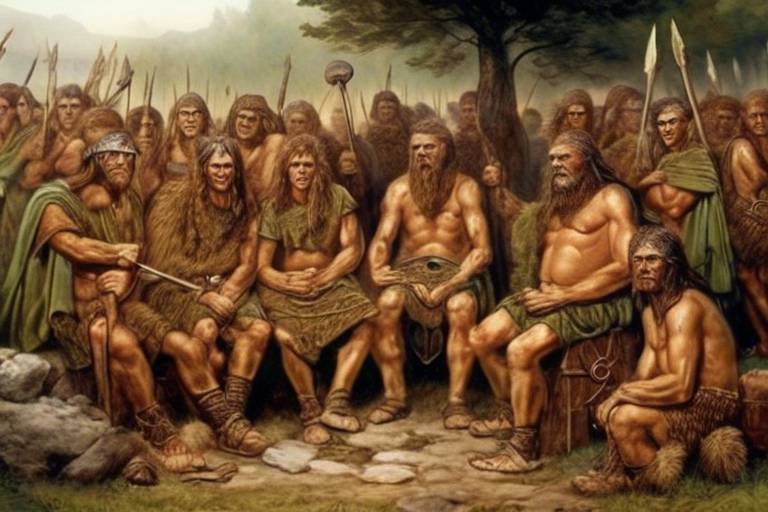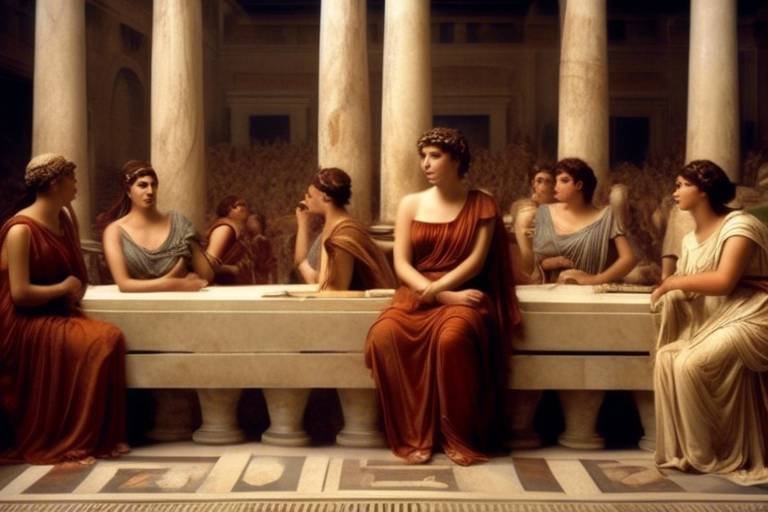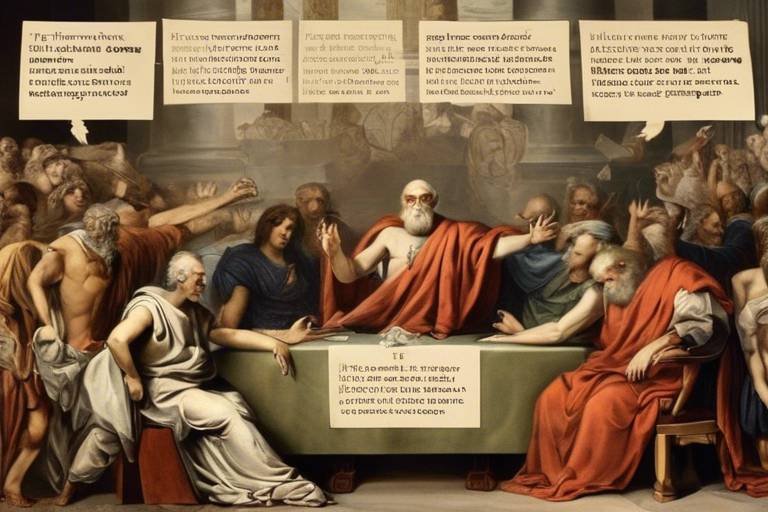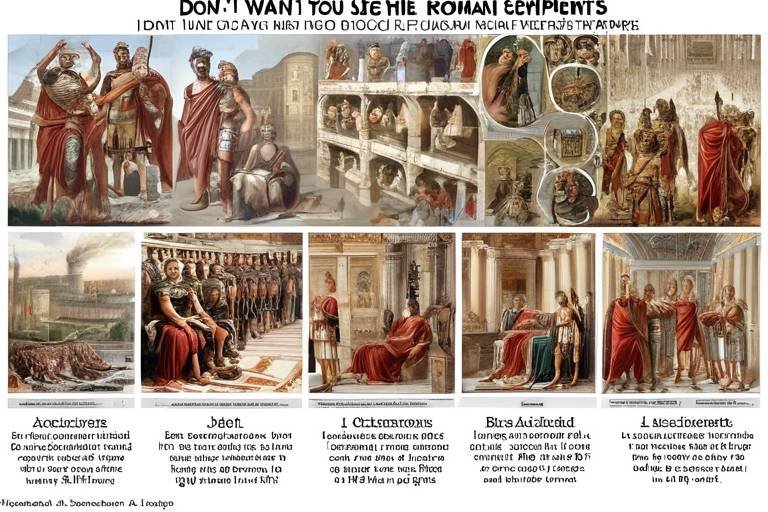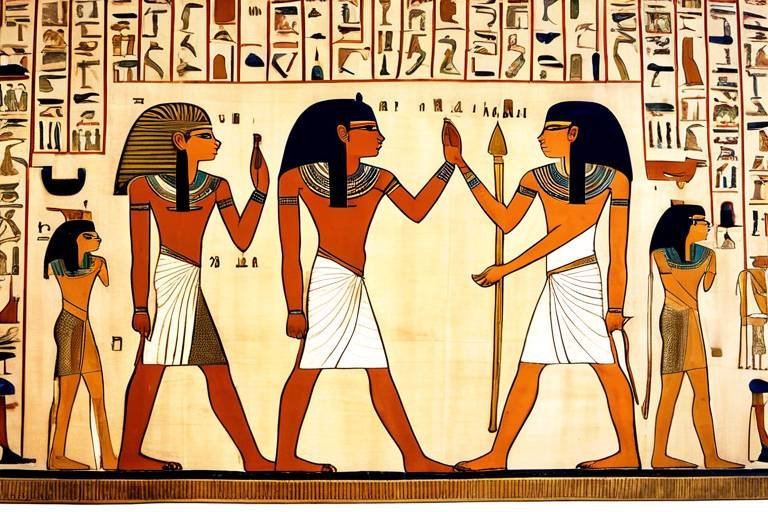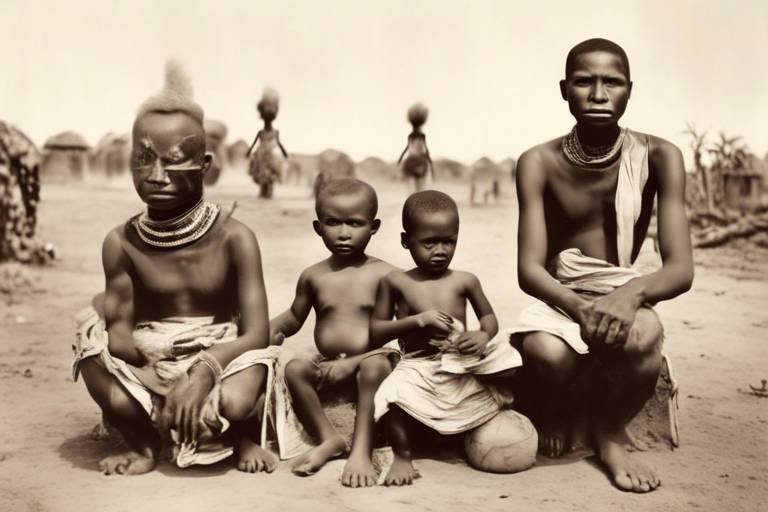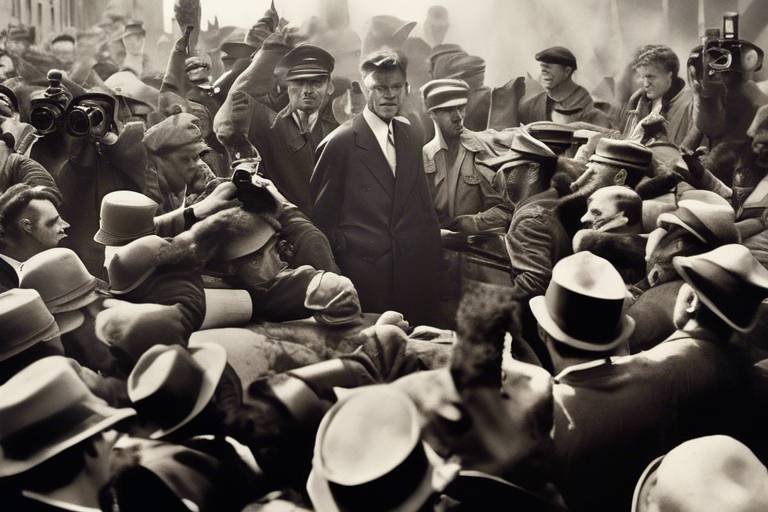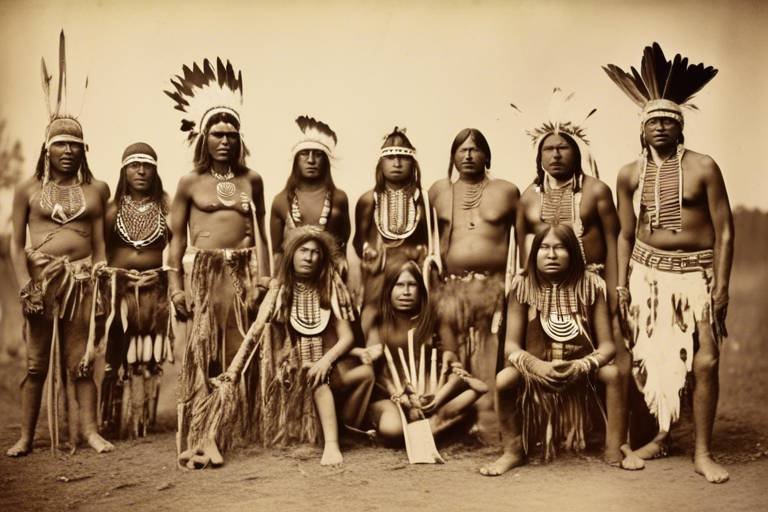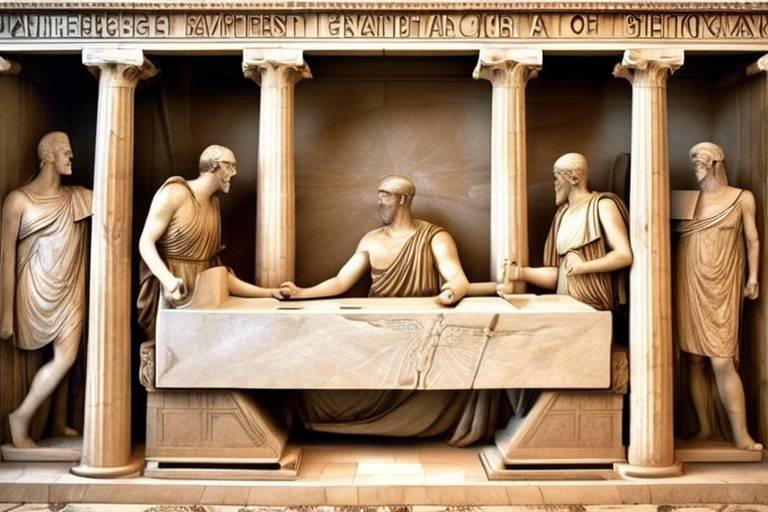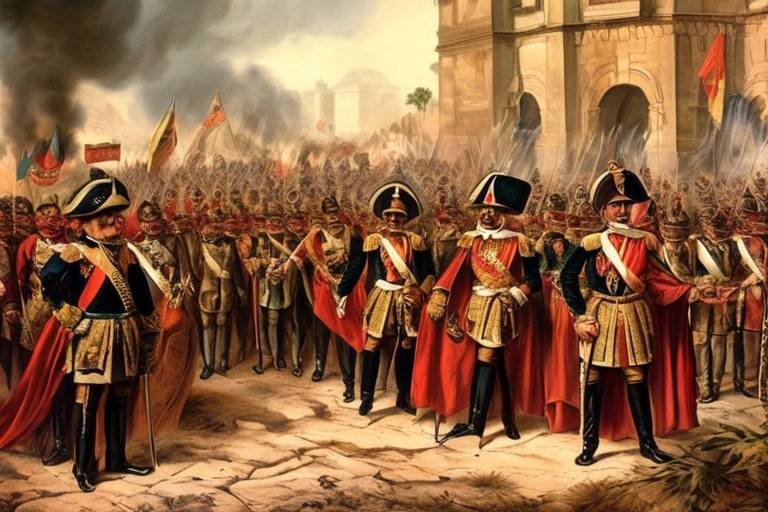The French Revolution - Liberty, Equality, Fraternity
The French Revolution, often hailed as a pivotal moment in history, embodies the core values of liberty, equality, and fraternity. This revolutionary period in French history marked a significant shift in societal norms and governance, challenging the existing power structures and advocating for fundamental rights for all individuals.
At the heart of the French Revolution lay a fervent desire for liberty, symbolizing the aspiration for freedom from oppressive monarchies and unjust societal hierarchies. The call for equality resonated deeply among the populace, seeking to abolish privilege based on birthright and establish a more just and egalitarian society. Additionally, the concept of fraternity emphasized the importance of solidarity and unity among citizens, fostering a sense of community and shared purpose.
As the revolution unfolded, it sparked a series of events that would shape the course of history. The French Revolution was not merely a struggle for power but a profound ideological battle that reverberated far beyond the borders of France. It inspired movements for democracy and human rights across the globe, leaving an indelible mark on the collective consciousness of nations.
The legacy of the French Revolution endures to this day, serving as a beacon of hope for those who champion the principles of liberty, equality, and fraternity. Its impact on modern societies is undeniable, influencing the development of democratic institutions, the recognition of individual rights, and the promotion of social justice.
Through the lens of history, the French Revolution stands as a testament to the enduring power of revolutionary ideals and the transformative potential of collective action. It serves as a reminder of the courage and resilience of those who dared to challenge the status quo in pursuit of a more just and equitable world.

Causes of the French Revolution
When delving into the causes of the French Revolution, one cannot overlook the complex interplay of social, political, and economic factors that set the stage for one of the most significant events in history. The seeds of discontent were sown in a society divided by class distinctions, where the privileged nobility and clergy enjoyed immense wealth and power, while the common people faced poverty, oppression, and lack of representation.
The burden of heavy taxation, coupled with a failing economy and a series of poor harvests, exacerbated the already dire conditions faced by the lower classes. The monarchy's extravagant spending, including funding the American Revolution, further strained the financial resources of the nation, leading to increased resentment among the populace.
Moreover, the rigid social structure and lack of social mobility stifled aspirations and fueled frustration among the burgeoning middle class, known as the bourgeoisie, who sought greater political influence and economic opportunities. The Enlightenment ideals of reason, liberty, and equality permeated society, challenging the traditional authority of the monarchy and the Catholic Church.
The convocation of the Estates-General in 1789, after a prolonged period of political stalemate, provided a platform for grievances to be aired and demands for reform to be made. However, the inability of the Estates-General to address the pressing issues facing the nation only served to escalate tensions and set the stage for the revolutionary fervor that was about to unfold.

Key Figures of the Revolution
The French Revolution was a tumultuous period in history that saw the rise of key figures who left a lasting impact on France and the world. These individuals played crucial roles in shaping the course of the revolution and influencing its outcomes. Let's delve into the lives and contributions of some of the most prominent figures of the French Revolution.
Maximilien Robespierre - The Incorruptible: Maximilien Robespierre, often referred to as "The Incorruptible," was a leading figure in the French Revolution known for his uncompromising stance on revolutionary ideals. As a key architect of the Reign of Terror, Robespierre implemented radical policies aimed at purging counter-revolutionary elements. His controversial legacy continues to spark debates about the use of violence in pursuit of political goals.
Marie Antoinette - The Queen of France: Marie Antoinette, the extravagant Queen of France, symbolized the excesses of the monarchy that fueled public discontent leading to the revolution. Her lavish lifestyle and perceived indifference to the plight of the common people made her a target of criticism and resentment. Despite her efforts to adapt to the changing political landscape, Marie Antoinette's fate became intertwined with the downfall of the monarchy.
Napoleon Bonaparte - Rise to Power: Napoleon Bonaparte, a skilled military general, rose to prominence during the chaos of the post-revolutionary era. Through his military conquests and political acumen, Napoleon eventually crowned himself Emperor of France, bringing stability to a nation weary from years of turmoil. His legacy as a transformative leader and architect of modern Europe endures to this day.
These key figures of the French Revolution embody the complexities and contradictions of an era marked by upheaval and transformation. Their actions and decisions reverberated far beyond their lifetimes, shaping the course of history and leaving behind a legacy that continues to be studied and debated.

Maximilien Robespierre - The Incorruptible
Maximilien Robespierre, known as "The Incorruptible," was a key figure in the French Revolution, renowned for his unwavering dedication to revolutionary ideals. Robespierre, a lawyer by profession, emerged as a prominent leader within the radical Jacobin faction of the National Convention. His fervent belief in the principles of equality and justice propelled him to the forefront of the Revolution, where he advocated for the rights of the common people and the eradication of corruption within the government.
Robespierre's political ideology centered around the concept of virtue and the necessity of upholding moral integrity in governance. He viewed himself as a guardian of the Revolution, fiercely opposing any individuals or groups deemed counter-revolutionary. Robespierre's uncompromising stance on matters of state led to his controversial implementation of the Reign of Terror, a period marked by mass executions of perceived enemies of the Revolution.
Despite his reputation for incorruptibility, Robespierre's radical policies and authoritarian methods eventually led to his downfall. The escalating violence and paranoia of the Reign of Terror alienated many of his former allies, culminating in his arrest and execution in 1794. Robespierre's legacy remains a subject of intense debate, with some lauding his commitment to revolutionary principles, while others condemn his descent into dictatorial practices.

Marie Antoinette - The Queen of France
Marie Antoinette, famously known as the Queen of France, was an iconic figure during the tumultuous period of the French Revolution. Born in Austria, she married Louis XVI of France at a young age, becoming the Queen and facing immense scrutiny from the French people. Her extravagant lifestyle and alleged indifference to the struggles of the common folk contributed to her negative portrayal in the eyes of the public.
Despite her lavish spending and reputation for frivolity, Marie Antoinette was also a devoted mother to her children and played a significant role in courtly affairs. She was known for her exquisite taste in fashion and her patronage of the arts, which further distanced her from the hardships faced by the French populace. As tensions escalated in the years leading up to the Revolution, Marie Antoinette became a symbol of the monarchy's disconnect from the reality of the common people.
During the Revolution, Marie Antoinette faced intense criticism and was eventually accused of treason, leading to her imprisonment and eventual execution by guillotine in 1793. Her tragic fate symbolized the downfall of the French monarchy and the end of an era marked by opulence and excess. Despite her controversial legacy, Marie Antoinette remains a fascinating and complex figure in history, embodying both the glamour and the tragedy of the royal court.

Reign of Terror
The Reign of Terror was a dark and tumultuous period during the French Revolution, marked by extreme violence, political instability, and widespread fear. It began in 1793, following the execution of King Louis XVI, as radical revolutionaries, led by figures like Maximilien Robespierre, sought to consolidate power and eliminate perceived enemies of the revolution.
One of the defining features of the Reign of Terror was the establishment of the Committee of Public Safety, a powerful governing body tasked with rooting out counter-revolutionary elements. Under the guise of protecting the revolution, the Committee initiated a campaign of mass arrests, trials, and executions, targeting anyone deemed a threat to the revolutionary government.
Thousands of individuals, including nobles, clergy, political opponents, and ordinary citizens, were sent to the guillotine or perished in prison during this period of intense paranoia and suspicion. The streets ran red with blood as the revolutionary tribunal handed down swift and merciless justice, often based on flimsy or fabricated evidence.
The Reign of Terror reached its peak in the summer of 1794, with Robespierre wielding near-absolute power and executing his vision of a purified republic. However, the tide soon turned against him as even his closest allies grew wary of his uncompromising tactics and dictatorial rule.
Ultimately, the Reign of Terror came to an abrupt end with the fall of Robespierre in July 1794, as he himself faced the guillotine amidst a climate of disillusionment and revulsion. The period left a lasting scar on the French psyche, serving as a cautionary tale of the dangers of unchecked power and ideological extremism.

Impact of the French Revolution
When examining the impact of the French Revolution, one cannot underestimate its profound influence on shaping not only French society but also the global political landscape. The revolutionary ideals of liberty, equality, and fraternity reverberated far beyond the borders of France, sparking movements for democracy and human rights around the world. The French Revolution served as a catalyst for the spread of these principles, challenging existing power structures and inspiring generations to strive for a more just and equitable society.
One of the key legacies of the French Revolution is its role in the development of modern concepts of democracy. The revolution marked a significant shift away from absolute monarchy towards more representative forms of government, laying the groundwork for the democratic systems that exist today. The revolutionary fervor that swept through France in the late 18th century set a precedent for popular sovereignty and the idea that political power ultimately resides with the people.
Furthermore, the French Revolution played a pivotal role in advancing the cause of human rights on a global scale. The Declaration of the Rights of Man and of the Citizen, adopted during the revolution, proclaimed the inherent rights and freedoms of all individuals, regardless of social status or background. This document served as a beacon of hope for oppressed peoples everywhere, inspiring movements for equality and justice in the centuries that followed.
Additionally, the French Revolution fostered a sense of nationalism among the French populace, uniting the country under a shared identity and sense of purpose. The revolutionary wars that ensued further solidified this nationalistic sentiment, as France fought to defend its newfound ideals against external threats. This sense of national pride and unity continues to resonate in French society today, shaping the country's cultural identity and political discourse.

Napoleon Bonaparte - Rise to Power
Napoleon Bonaparte, a name synonymous with ambition and power, rose to prominence during the tumultuous period of the French Revolution. Born in Corsica in 1769, Napoleon's military prowess and strategic acumen quickly propelled him through the ranks of the French army. His meteoric rise to power began with his successful campaigns in Italy, where he demonstrated his tactical genius and leadership skills.
As Napoleon's victories mounted, so did his ambition. In 1799, he orchestrated a coup d'état that toppled the Directory, the ruling government of France, and established himself as First Consul. This marked the beginning of his consolidation of power and the transformation of France under his rule.
With a keen understanding of politics and a vision for a strong, centralized government, Napoleon implemented a series of reforms that modernized France and solidified his authority. His crowning achievement came in 1804 when he declared himself Emperor of the French, signaling the zenith of his power and influence.
Under Napoleon's rule, France experienced a period of stability and prosperity, marked by economic growth, legal reforms, and the spread of French ideals across Europe. However, his expansionist ambitions and military conquests ultimately led to his downfall, culminating in the disastrous Russian campaign and the Battle of Waterloo in 1815.
Despite his eventual defeat and exile, Napoleon's legacy endures as one of the most influential figures in history. His rise to power exemplifies the turbulent and transformative nature of the French Revolution, showcasing the heights to which ambition and determination can lead, as well as the pitfalls of unchecked ambition and overreach.

Legacy of the Revolution
The legacy of the French Revolution reverberates through the annals of history, leaving an indelible mark on the fabric of modern societies. This seismic event, with its fervor for liberty, equality, and fraternity, sparked a revolution of thought that continues to shape our world today. The ideals championed during this tumultuous period have transcended time, inspiring movements for social justice and political reform across the globe.
One of the most enduring legacies of the French Revolution is its impact on the political landscape of Europe. The overthrow of the monarchy and the establishment of a republic set a precedent for the dismantling of traditional power structures and the rise of democratic governance. The revolutionary fervor that swept through France in the late 18th century ignited a flame that would eventually engulf the world in the quest for self-governance and individual rights.
Furthermore, the French Revolution played a pivotal role in the development of modern concepts of democracy and human rights. The Declaration of the Rights of Man and of the Citizen, adopted during the revolution, laid the groundwork for the recognition of fundamental rights and freedoms for all individuals. This document, with its emphasis on equality before the law and the protection of civil liberties, served as a beacon of hope for oppressed peoples seeking liberation from tyranny.
Moreover, the French Revolution fostered a sense of nationalism that would shape the identity of nations for centuries to come. The idea of a unified nation, bound by shared values and aspirations, emerged as a powerful force in the aftermath of the revolution. The concept of national sovereignty and the rights of citizens to determine their own destiny became entrenched in the collective consciousness of peoples around the world.
The legacy of the French Revolution is a complex tapestry of triumphs and tragedies, of lofty ideals and harsh realities. While the revolution unleashed a wave of change that transformed the course of history, it also brought about violence, upheaval, and uncertainty. The Reign of Terror, with its mass executions and political purges, stands as a stark reminder of the dangers of unchecked power and ideological extremism.
In conclusion, the legacy of the French Revolution endures as a testament to the enduring power of revolutionary spirit and the quest for a more just and equitable society. As we reflect on the events of that tumultuous period, we are reminded of the sacrifices made, the ideals upheld, and the ongoing struggle for a world guided by the principles of liberty, equality, and fraternity.
Frequently Asked Questions
- What were the main causes of the French Revolution?
The French Revolution was primarily sparked by a combination of social, political, and economic factors. Widespread inequality, high taxes on the common people, and a repressive monarchy all contributed to the growing discontent among the French population.
- Who were some key figures of the French Revolution?
Notable figures of the French Revolution include Maximilien Robespierre, known for his radical views and leadership during the Reign of Terror, Marie Antoinette, the extravagant Queen of France, and Napoleon Bonaparte, who rose to power as Emperor of France.
- What was the Reign of Terror?
The Reign of Terror was a period of extreme violence and political repression during the French Revolution. It was marked by mass executions, political purges, and the establishment of revolutionary tribunals to eliminate perceived enemies of the revolution.
- How did the French Revolution impact modern society?
The French Revolution had a profound impact on modern society, influencing the development of democratic principles, human rights, and nationalism. Its ideals of liberty, equality, and fraternity continue to shape political discourse and social movements around the world.



